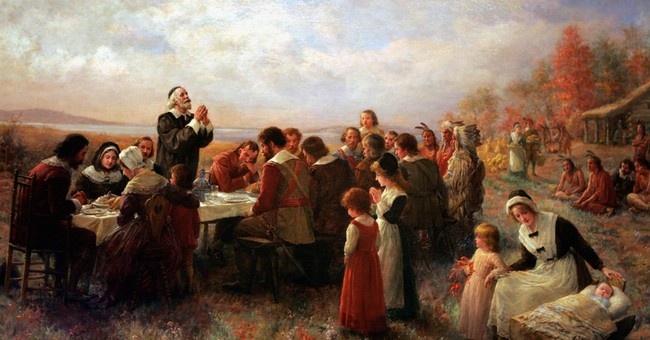Thankful for Property John Stossel | Nov 27, 2013
Thankful for PropertyJohn Stossel | Nov 27, 2013 Had today's politicians and opinion-makers been in power four centuries ago, Americans might celebrate "Starvation Day" this week, not Thanksgiving. The Pilgrims started out with communal property rules. When they first settled at Plymouth, they were told: "Share everything, share the work, and we'll share the harvest." The colony's contract said their new settlement was to be a "common." Everyone was to receive necessities out of the common stock. There was to be little individual property. That wasn't the only thing about the Plymouth Colony that sounds like it was from Karl Marx: Its labor was to be organized according to the different capabilities of the settlers. People would produce according to their abilities and consume according to their needs. That sure sounds fair. They nearly starved and created what economists call the "tragedy of the commons." If people can access the same stuff by working less, they will. Plymouth settlers faked illness instead of working the common property. The harvest was meager, and for two years, there was famine. But then, after the colony's governor, William Bradford, wrote that they should "set corn every man for his own particular," they dropped the commons idea. He assigned to every family a parcel of land to treat as its own. The results were dramatic. Much more corn was planted. Instead of famine, there was plenty. Thanks to private property, they got food -- and thanks to it, we have food today. This doesn't mean Pilgrims themselves saw the broader economic implications of what they'd been through. "I don't think they were celebrating Thanksgiving because they'd realized that capitalism works and communal property is a failure," says economist Russ Roberts. "I think they were just happy to be alive." I wish people understood. This idea that happiness and equality lie in banding together and doing things as a commune is appealing. It's the principle behind the Soviet Union, Medicare, the Vietnam War, Obamacare and so on. Some communal central planning is helpful, but too much is dangerous. The Pilgrims weren't the first settlers on the East Coast of the New World to make this mistake. Just a few years before, the colony of Jamestown was almost wiped out by the same idea. Historian Edmund S. Morgan, in "American Slavery, American Freedom: The Ordeal of Colonial Virginia," describes what happened in 1609-1610: "There are 500 people in the colony now. And they are starving. They scour the woods listlessly for nuts, roots and berries. And they offer the only authentic examples of cannibalism witnessed in Virginia. One provident man chops up his wife and salts down the pieces. Others dig up graves to eat the corpses. By spring only sixty are left alive." After that season, the colony was abandoned for years. The lesson that a commons is often undesirable is all around us. What image comes to mind if I write "public toilet"? Consider traffic congestion and poor upkeep of many publicly owned roads. But most people don't understand that the solution is private property. When natural resources, such as fish and trees, dwindle, the first impulse is to say, "Stop capitalism. Make those things public property." But they already are public -- that's the problem. If no one owns the fishing rights to a given part of the ocean -- or the exclusive, long-term logging rights to part of the forest -- people have an incentive to get there first and take all they can before the next guy does. Resources are overused instead of conserved. We don't maintain others' property the way we maintain our own. Colonists in Plymouth nearly starved because they didn't understand that. In Jamestown, some were driven to cannibalism. But no one starves when ranchers are allowed to own land and cattle. Or turkeys. Private ownership does good things. Be thankful for it this week. John Stossel Follow @twitterapi John Stossel is host of "Stossel" on the Fox Business Network. He's the author of "No They Can't: Why Government Fails, but Individuals Succeed." To find out more about John Stossel, visit his site at >johnstossel.com.Carl Ray Louk Not racist, not violent, just not silent anymore Fighting for lower taxes, less government, and more freedom. I am Carl Ray Louk and unlike the President of the United States of America, Barack Hussein Obama, I stand with Israel FreedomWorks We are a community of over 2 million grassroots activists We recruit, educate & mobilize across the country Fighting for lower taxes, less government, and more freedom. http://www.freedomworks.org/ "Friendship Never Ends" SG-1996 "Let Love Lead The Way" SG-2000 "The Phoenix Shall Rise" Count Carl Ray Louk 2003 "Even A Man Who Is Pure In Heart And Says His Prayer By Nigh, May Become A Wolf When the Wolf bane Blooms And The Autumn Moon Is Bright." LT-1941 "Flesh of my flesh; blood of my blood; kin of my kin when I say come to you, you shall cross land or sea to do my bidding!" CVTD-1895 "From Hell's Heart I stab at thee, for hate sake I spit my last breath at thee" CA-1895 "I have been, and always shall be your friend" Spock "Trick or Treat, Trick or Treat candy is dandy but murder, oh murder, is so sweet" Count Carl Ray Louk-2003 "Eye of newt, and toe of frog, wool of bat, and tongue of dog adder's fork, blind worm's sting, lizard's leg, and owlet's wing. For a charm of powerful trouble, like Hell broth boils and babble. Double, double, toil and trouble, fire burn, and caldron bubble" WS Facebook: www.facebook.com/CarlRayLouk Twitter: www.twitter.com/CarlRayLouk MySpace: www.myspace.com/carlraylouk Yahoo Group: Yahoo! Groups : LouksHauntedGraveyardhttp://groups.yahoo.com/group/LouksHauntedGraveyard/ Yahoo Group: Yahoo! Groups : TheWorldAccordingtoCarlRayLouk http://groups.yahoo.com/group/TheWorldAccordingtoCarlRayLouk/ |



0 Comments:
Post a Comment
<< Home